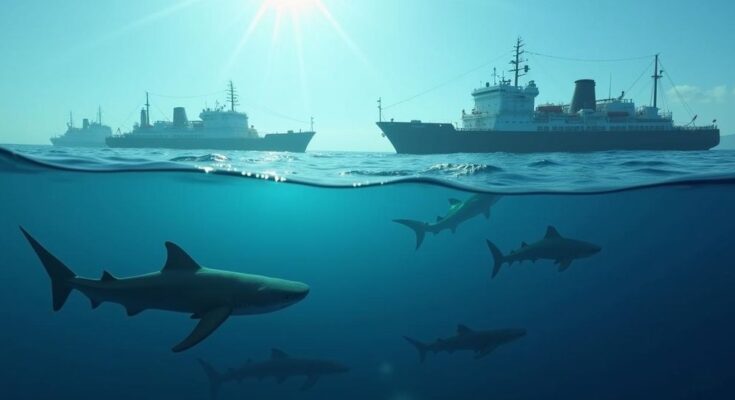A new study indicates that global warming may dramatically increase the risk of large ship collisions with whale sharks, predicting a rise in co-occurrence by 15,000 times by the end of the century. Significant habitat loss—over 50% in some areas—could occur unless emissions are reduced, with potential impacts mitigated through sustainable practices. The research underscores the urgent need for integrating climate considerations into marine conservation efforts.
A recent study published in Nature Climate Change by researchers from the University of Southampton and the Marine Biological Association (MBA) reveals that global warming poses an increased risk to whale sharks from large vessels. The researchers project that as ocean temperatures rise, whale sharks may move into new habitats that intersect with busy shipping lanes, resulting in a predicted increase of co-occurrence of these marine giants and shipping traffic by a staggering 15,000 times by the century’s end. Lead author Dr. Freya Womersley emphasizes that under high emission scenarios, notable shifts in whale shark habitats could occur, leading to significant core habitat losses and heightened interactions with shipping activity. Whale sharks, being the largest fish in the ocean, are known for their adaptability to temperature changes; however, they are also susceptible to ship strikes, which often result in severe injuries or fatalities. The study employed satellite tracking data in conjunction with global climate forecasts to assess whale shark distributions under varied climate scenarios. Predictions indicate that certain national waters could witness over 50% habitat loss by 2100, particularly in Asia, unless emissions are mitigated effectively. Some regions, however, could see improved core habitats under sustainable development pathways. Professor David Sims, a co-author of the study, notes that significant shifts can be mitigated if climate warming is addressed. The findings highlight the complex interplay between climate change and human activity, suggesting a critical need for integrating climate considerations into species management strategies. This research underscores the urgency of addressing climate change to protect vulnerable marine species like the whale shark.
The issue of whale shark conservation is becoming increasingly pressing in light of climate change and its impacts on marine ecosystems. Whale sharks, as the world’s largest fish, are highly mobile and sensitive to changes in environmental conditions, particularly temperature. Global warming leads to alterations in the distribution of marine species and habitats, pressing whale sharks into areas that may overlap hazards such as busy shipping routes. The growing shipping industry, projected to expand significantly in the coming decades, poses an escalating threat to marine wildlife through potential collisions, particularly when species shift their habitats in response to changing ocean conditions. Therefore, understanding these dynamics is crucial for developing effective conservation strategies.
The research published in Nature Climate Change reveals a frightening forecast for whale sharks as climate change intensifies interactions with shipping traffic. Under high emissions scenarios, these giants may encounter over 15,000 times more ships by 2100, leading to significant habitat loss and increased collision risks. However, proactive measures toward sustainable development can moderate these impacts, reinforcing the necessity for immediate action to address climate change. The study advocates for the integration of climate change considerations into marine species management to ensure the survival of vulnerable species like the whale shark.
Original Source: www.eurekalert.org




